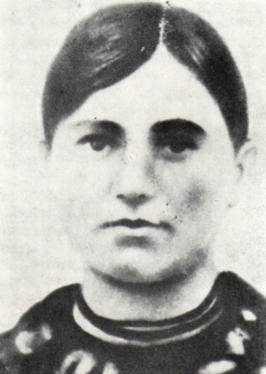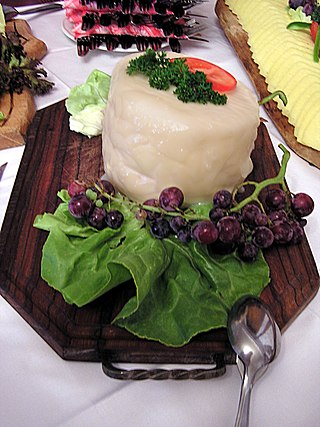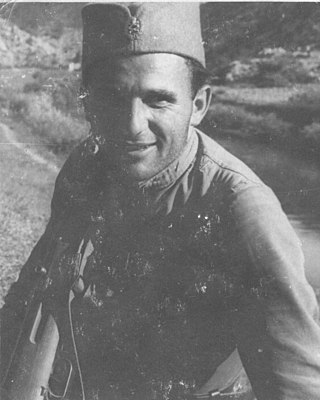
Lika is a traditional region of Croatia proper, roughly bound by the Velebit mountain from the southwest and the Plješevica mountain from the northeast. On the north-west end Lika is bounded by Ogulin-Plaški basin, and on the south-east by the Malovan pass. Today most of the territory of Lika is part of Lika-Senj County. Josipdol, Plaški and Saborsko are part of Karlovac County and Gračac is part of Zadar County.

Bosanska Krajina is a geographical region, a subregion of Bosnia, in western Bosnia and Herzegovina. It is enclosed by a number of rivers, namely the Sava (north), Glina (northwest), Vrbanja and Vrbas. The region is also a historic, economic and cultural entity of Bosnia and Herzegovina, noted for its preserved nature and wildlife diversity.

Skyr is a traditional Icelandic cultured dairy product. It has the consistency of strained yogurt, but a milder flavor. Skyr can be classified as a fresh sour milk cheese, similar to curd cheese consumed like a yogurt in the Baltic states, the Low Countries and Germany. It has been a part of Icelandic cuisine for centuries.

Operation Rösselsprung was a combined airborne and ground assault by the German XV Mountain Corps and collaborationist forces on the Supreme Headquarters of the Yugoslav Partisans in the Bosnian town of Drvar in the Independent State of Croatia during World War II. It was launched 25 May 1944, with the goal of capturing or killing Partisan leader Marshal Josip Broz Tito and destroying the headquarters, support facilities and co-located Allied military missions. It is associated with the Seventh Enemy Offensive in Yugoslav history, forming part of the Seven Enemy Offensives historiographical framework. The airborne assault itself is also known as the Raid on Drvar.
Bosnian cuisine is the traditional cuisine of Bosnia and Herzegovina. It is influenced by Ottoman, Austro-Hungarian and Balkan cuisines.

Marija Bursać was a member of the Yugoslav Partisans during World War II in Yugoslavia and the first woman proclaimed a People's Hero of Yugoslavia. Bursać was born to a Bosnian Serb farming family in the village of Kamenica, near Drvar. After the invasion of Yugoslavia by the Axis powers and their creation of the Independent State of Croatia in April 1941, Bursać supported the Partisan resistance movement led by the Communist Party of Yugoslavia (KPJ). Like other women in her village, she collected food, clothing, and other supplies for the Partisan war effort. Bursać became a member of the League of Communist Youth of Yugoslavia in September 1941. The following August she was appointed political commissar of a company of the 1st Krajina Agricultural Shock Brigade, which harvested crops in the Sanica River valley, and was admitted to the KPJ at the end of that summer.

Petrovac is a municipality in Republika Srpska, Bosnia and Herzegovina. It is situated in the western part of Republika Srpska and the central part of the Krajina region. Petrovac was created from a small part of the pre-war municipality of Bosanski Petrovac, whose remaining portion kept the original name and is a part of the Federation of Bosnia and Herzegovina. The municipality seat is the village of Drinić.
Bjelaj is a village in the municipality of Bosanski Petrovac, Federation of Bosnia and Herzegovina, Bosnia and Herzegovina. In the population census of 1991 there lived 569 inhabitants. The Village is dominated by the ruined fortress of Stari Grad Bjelaj.

Drinić is a village and seat of the municipality of Petrovac, Republika Srpska, Bosnia and Herzegovina and is also located partly in the municipality of Bosanski Petrovac. It is also known for strangely being the geographical center of Croatia, despite being located in Bosnia and Herzegovina far from the border between two countries.
The Srb uprising was a rebellion against the Independent State of Croatia that began on 27 July 1941 in Srb, a village in the region of Lika. The uprising was started by the local population as a response to persecutions of Serbs by the Ustaše and was led by Chetniks and Yugoslav Partisans. It soon spread across Lika and Bosanska Krajina. During the uprising numerous war crimes were committed against local Croat and Muslim population, especially in the area of Kulen Vakuf. As NDH forces lacked the strength to suppress the uprising, the Italian Army, which was not a target of the rebels, expanded its zone of influence to Lika and parts of Bosanska Krajina.

Sura Kees, also known as Vorarlberger Sauerkäse or Montafoner Sauerkäse is a low-fat sour milk cheese originally from the Montafon valley in Vorarlberg (Austria). It is traditionally made from skim milk and is a by-product of butter production. Sura Kees resembles the Tyrolean Grey Cheese.
Radio Bosanski Petrovac is a Bosnian local public radio station, broadcasting from Bosanski Petrovac, Bosnia and Herzegovina. As a municipal radio, this station broadcasts a variety of programs such as local news, talk shows and music. Program is mainly produced in Bosnian language at one FM frequency.
Radio Bosanska Krupa is a Bosnian local public radio station, broadcasting from Bosanska Krupa, Bosnia and Herzegovina. As a municipal radio, this station broadcasts a variety of programs such as local news, talk shows and music. Program is mainly produced in Bosnian language at one FM frequency.

The Drvar uprising was the World War II uprising of the Serb population of Bosnian Krajina. Italy supported it, both politically and in arms, in its struggle against the fascist puppet state of the Independent State of Croatia between 27 July and 26 September 1941.

Mane Rokvić was a Serb guerrilla commander and collaborator with the Axis occupation forces during the Second World War. Rokvić briefly became commander of the Yugoslav Partisan 4th detachment of the Sloboda Battalion during the 1941 Drvar uprising, a spontaneous resistance by the Serbian population to the genocidal activities of the Independent State of Croatia in Western Bosnia. Later and most notably, Rokvić left the communist cause to join the royalist Dinara Chetnik Division to command the King Alexander I regiment. He went on to collaborate with the Germans to fight against the Yugoslav Partisans.

The Bihać operation was a military operation conducted by Yugoslav partisans against the Independent State of Croatia (NDH) and Nazi Germany during World War II. The aim of the operation was to capture Bihać and the surrounding towns to connect Partisan held areas in Bosanska Krajina, and Knisnka Krajina. The battle for the city of Bihać lasted from 2 November to 4 November 1942. After capturing the city, the partisans continued to fight in surrounding areas until 15 November. The operation resulted in a major Partisan victory, with Bihać and the surrounding areas being captured, and the NDH suffering significant casualties.
Radio Unsko-sanskog kantona or Radio USK is a Bosnian local public radio station, broadcasting from Bihać, Bosnia and Herzegovina and it broadcasts a variety of programs such as news, music, morning and talk shows. Program is operated by RTV USK and it is mainly produced in Bosnian language.
On 7 August 1995, two Croatian Air Force MiG-21 planes fired several rockets at a Serb refugee column on a road near Bosanski Petrovac, Bosnia and Herzegovina, killing 9 civilians and injuring more than 50. On 8 August 1995, another attack took place, resulting in more civilian casualties. The victims were traveling in a refugee column fleeing Croatia during Operation Storm which brought about an end to the Croatian War of Independence.











